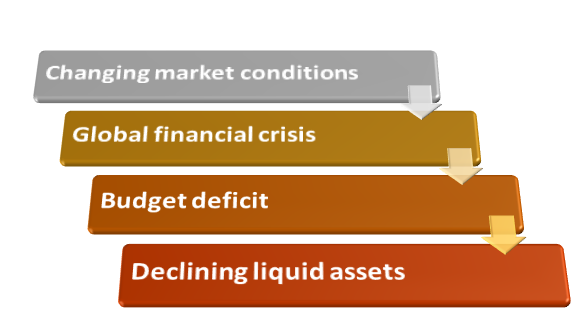What is a hiring freeze?
A hiring freeze occurs when an organisation temporarily halts non-essential employee hiring to save money, notably when a company is in financial distress. A recession or other economic crisis, such as one that results in production redundancy or overcapacity, may push management to employ such cost-cutting measures.
Hiring freezes can be in place for a long or short period, and they are frequently utilised to avert layoffs. Hiring freezes are achieved by not filling available positions established by natural attrition or worker terminations.
Hiring freezes can occur in both failing and successful businesses that are facing unanticipated financial issues. A sudden economic downturn, product failure, catastrophic incident, unanticipated cost, or cost surge may prompt management to believe that decreasing costs is the best short-term answer.
Summary
- When a corporation stops hiring new employees for a set period, it is known as a hiring freeze.
- Hiring freezes are frequently applied when a firm is experiencing an economic downturn or financial difficulties.
- During hiring freezes, existing employees are frequently put under additional stress since they must assume the tasks of unfilled positions.
Frequently Asked Questions (FAQs)
Why do businesses implement hiring freezes?
Every business is managed to ensure its long-term financial viability. When a business records significant cash flow issues resulting from a substantial drop in income or poor market conditions, the primary goal is to preserve funds to keep operations afloat. In these circumstances, a company's management is more inclined to impose a hiring freeze.

Source: © Rummess | Megapixl.com
The following are some examples of situations where a corporation would seek a hiring freeze:
Changing market conditions
Market moves can have a significant impact on overall profitability and revenue creation. Consider the ceiling board industry, which has seen a drop because of economic downturns. To counteract the effects of changes in market conditions, all enterprises directly concerned with the distribution, manufacture, or value-added services in the ceiling board industry may institute employment freezes.
Global financial crisis
The breakout of the COVID-19 pandemic has had a detrimental influence on businesses across the world. Businesses may postpone hiring new personnel at such times instead of focusing on global markets and trends. Employers become more cautious and restrictive to ensure that they can at least retain their current personnel.
Budget deficit
Suppose a corporation sees that recruiting new staff will lead to a budget deficit for a specific financial period. In that case, it will postpone hiring new employees until the company's financial condition has recovered.
Declining liquid assets
If a management team notices a drop in liquid assets, they may decide to postpone the hiring process. An employer can quickly detect liquidity concerns by using liquidity ratios. There should always be enough current assets to cover short-term liabilities in an ideal environment. However, rigorous liquidity-improvement measures may be used as a last resort if there is no other option. A company's pay budget could be used to finance current assets.
Hiring freezes allow businesses to avoid or reduce the creation or filling of non-essential positions. It also allows employers to reorganise work teams and integrate employees, resulting in increased productivity in supplying vital services and products. Even after establishing a hiring freeze, a company's goal remains to create profit.
It's also worth noting that the hiring halt does not imply that recruitment is entirely halted. Businesses will need to replace individuals who perform essential functions such as meeting consumer needs or filling specialist positions. Part-time employees, contractual employees, or consultants can fill such vacancies more rapidly, allowing firms to navigate around the employment restriction while still having enough resources to finish the job necessary to maintain their core operations.

Source: Copyright © 2021 Kalkine Media
How should businesses handle a hiring freeze?
Whenever a hiring freeze becomes inevitable, companies should do everything they can to keep their internal staff informed in a positive, timely, and professional manner. Even if the memo or statement is intended to be internal, there is a strong possibility it will be leaked to the public. If the message were to be shared externally, it should be on-brand for the organisation and represent it properly, just like other internal notifications.
Consider using the following elements in the hiring freeze declaration:
- Date, firm name, and other pertinent information should be included on the letterhead.
- A formal greeting, like "Dear hiring managers."
- The date when freeze commences, the expected end date, whom it impacts, how exceptions are managed, and so on are all elements of informative statements.
- An explanatory statement could contain what circumstances have necessitated a hiring freeze, efforts done to attempt to avoid it, instances of previous hiring freezes and their positive outcomes, and so on.
What are the consequences of a hiring freeze?
Existing employees may be squeezed by a hiring freeze because there may be no substitutes for those who leave the organisation.
Existing employees are frequently put under additional strain due to having to fulfill the duties of vacant positions. There are possibilities; if the situation becomes too extreme, overall performance and employee work satisfaction may decrease. Employees may leave the company if they believe their task is excessive and they are not appropriately compensated.
Managers may be compelled to keep low-performing employees instead of dealing with their underperformance through corrective action or termination if a hiring freeze is in place.
Furthermore, freelancing, hiring temporary, or other casual employees may negate some of the cost savings achieved by a hiring freeze and create a lack of continuity or loss of transferable job skills or intelligence when reviewing resumes.
A hiring freeze is basically a stopgap solution, a pretty easy way to save cash that is effective from a purely financial standpoint.
Is money the sole requirement for a firm to succeed? A firm's reputation is crucial to its success. In addition, it is essential for gaining and maintaining consumer loyalty, attracting, and retaining quality staff.
Companies' reputations are critical to job searchers. Who hasn't read the ratings of a potential employer on a job board? Restoring a company's reputation and trust takes a long time once it has been broken.
 Please wait processing your request...
Please wait processing your request...